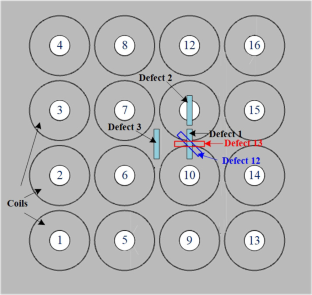Reconstruction of Metal Defect Images Based on the Sensitivity Matrix of High Conductivity Initial Estimate for Eddy Current Tomography
Abstract
Eddy current testing is one of the conventional non-destructive testing (NDT) technologies which is widely used in metal defects detection. Defect imaging by eddy current tomography (ECT) has advantages of visualization of defects, large detection area, fast detection speed and avoiding mechanical scanning imaging error. Sensitivity matrix is crucial in reconstructing defect images of metal materials by ECT. This article presents a sensitivity matrix of high conductivity initial estimate for ECT detecting metal materials. A 4\(\times \)4 eddy current planar coil array and a 2 mm thickness titanium plate with defects were designed by both simulation and experiment. Based on the proposed sensitivity matrix, reliability of ECT forward problem linearization was analyzed and image reconstruction with two typical regularization methods (\(L_1\) and \(L_2\)) were investigated. Both simulation and experiment results show that ECT forward problem linearization was more accurate and reliable with the proposed sensitivity matrix especially at higher frequency. And \(L_1\) regularization method was verified to be more suitable to reconstruct image of small defects in metal materials. This work expands the original assumption of ECT forward problem linearization, which is of great significance to improve the metal defect image accuracy of ECT.


 求助内容:
求助内容: 应助结果提醒方式:
应助结果提醒方式:


